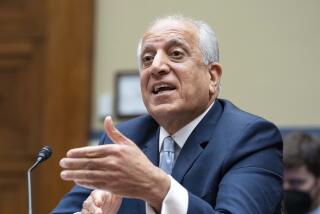Shultz Passes Word: He Intends to Stay on Job
- Share via
WASHINGTON — Secretary of State George P. Shultz, fighting to keep the uproar over Iranian arms sales from decimating U.S. foreign policy, passed the word Wednesday that he intends to remain in his post for the rest of the Reagan Administration.
“The secretary has every intention of staying the course to the end of the Administration,” State Department spokesman Charles Redman said, branding as “dead wrong” reports that Shultz already had submitted his resignation.
Whether Shultz can make good on his vow remains to be seen, however. Some of President Reagan’s California confidants are known to be calling for a “clean sweep” of top-level positions that would force Shultz and White House Chief of Staff Donald T. Regan to follow former national security adviser John M. Poindexter out of the Administration.
To Maintain Continuity
But Shultz is determined to keep his job to maintain continuity in foreign policy, State Department officials said. And, they added, Shultz is convinced that a new secretary of state would find it difficult to get control of the levers of policy in the Administration’s remaining two years.
Meanwhile, Shultz is determined to use all of his bureaucratic skills to hold onto the post, the officials said.
“The first priority is to re-establish credibility,” one State Department official noted. “We are going to tell friendly governments what we know about this situation. Anything that comes out in the investigation will be shared with every government in the world.”
Redman’s announcement that Shultz will not quit came just 24 hours after the State Department said Reagan had given Shultz responsibility for “management and implementation” of U.S. policy toward Iran. That move, in turn, ended an 18-month period in which the National Security Council staff--while keeping the State Department largely uninformed--arranged and supervised the shipment of arms to Iran in an attempt to obtain freedom for American hostages in Lebanon, as well as the diversion of some of the proceeds to the Nicaraguan rebels.
‘At the President’s Pleasure’
On Wednesday, Redman reiterated that Shultz “serves, of course, at the President’s pleasure--and the President wants him to continue.” Reagan told a news conference last week that he wanted Shultz to remain. He did not repeat that assertion this week in his brief statement on the Iranian arms question Tuesday or in quick interchanges with reporters at other times.
“Shultz does not want to leave as a failed secretary of state,” said Helmut Sonnenfeldt, a senior national security official in the Richard M. Nixon and Gerald R. Ford administrations. “He has gotten very interested in policy toward the Soviet Union and the arms control business.”
Nevertheless, Shultz’s continued tenure probably hinges on his ability to convince the public that he knew virtually nothing about either the sale of U.S. arms to Iran or the diversion of some of the proceeds to the rebels, known as contras.
Redman insisted Wednesday that no one in the State Department knew about the Nicaraguan connection--and he specifically noted that Shultz and Elliott Abrams, assistant secretary for inter-American affairs, were kept completely in the dark.
Only Fragmentary
Previously, Shultz has acknowledged that he had some information about the shipment of arms to Iran, although he contended that the information was only fragmentary.
Once details of the arms program began to leak out, Shultz made it clear that he opposed sending weapons to the Tehran regime and was against any policy that smacked of paying ransom for the hostages. In the process, he put distance between himself and an initiative that Reagan continues to insist was not a mistake. Shultz clearly angered many members of the White House staff for failing to give full support to a presidential initiative.
But nothing indicates that Shultz attempted to reverse the policy before the story first appeared in the media. Indeed, his White House detractors say his failure to act before the matter became public casts doubt on the sincerity of his later opposition to the program.
One senior State Department official has said Shultz never was told about Reagan’s order last Jan. 17 authorizing the sale of arms to Iran--which would explain why Shultz did not act, but it raises other questions about whether he was deceived or simply chose to ignore the matter.
More to Read
Sign up for Essential California
The most important California stories and recommendations in your inbox every morning.
You may occasionally receive promotional content from the Los Angeles Times.










